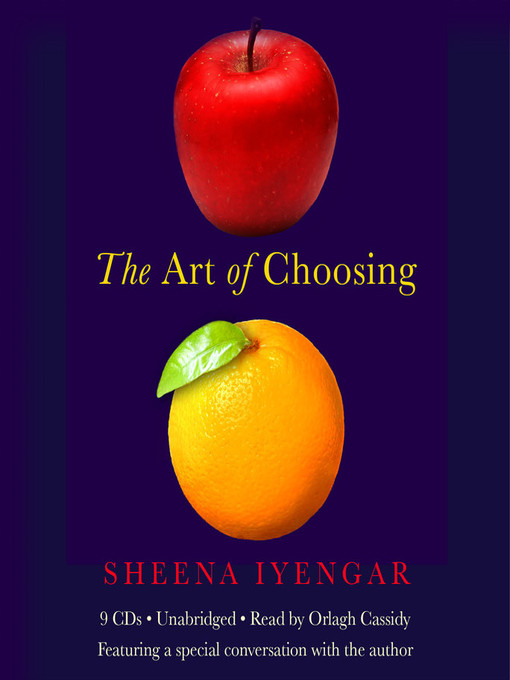
The Art of Choosing
کتاب های مرتبط
- اطلاعات
- نقد و بررسی
- دیدگاه کاربران
نقد و بررسی

Why would you choose to listen to this audiobook? As Sheena Iyengar points out in her engaging study, our choices are part of a constantly changing interactive relationship with our environment. We choose our clothes, for example, to distinguish ourselves from what we perceive to be "average," and yet we don't want to stand out too much. We fiercely believe in choosing our own life partners, yet 20 years after tying the knot, people in arranged marriages tend to be happier. Before the fall of Communism, Eastern Europeans were unhappy about their limited consumer choices, yet years after the fall many of them find consumer choice to be a prison. Orlagh Cassidy narrates with a scholarly, balanced sensibility that keeps the work appealing. She adds an empathetic touch when recounting Iyengar's anecdotes about her childhood and Sikh extended family. Those who loved BLINK, THE WISDOM OF CROWDS, or FREAKONOMICS are sure to enjoy this. R.W.S. (c) AudioFile 2010, Portland, Maine

Starred review from January 18, 2010
“Choice,” perhaps the highest good in the American socioeconomic lexicon, is a very mixed blessing, according to this fascinating study of decision making and its discontents. Psychologist Iyengar cites evidence that a paucity of choice can damage the mental and physical health of dogs, rats, and British civil servants alike. But, she contends, choice can also mislead and burden us: advertising manipulates us through the illusion of choice; a surfeit of choices can paralyze decision making; and some choices, like the decision to withdraw life support from a loved one, are so terrible that we are happier if we delegate them to others. Iyengar draws on everything from the pensées
of Albert Camus to The Matrix
, but her focus is on the ingenious experiments that psychologists have concocted to explore the vagaries of choice. (In her own experiment, shoppers presented with an assortment of 24 jams were 1/10th as likely to buy some than those who were shown a mere six.) Iyengar writes in a lucid, catchy style, very much in the Malcolm Gladwell vein of pop psychology–cum–social commentary, but with more rigor. The result is a delightful, astonishing take on the pitfalls of making up one's mind.

March 29, 2010
Iyengar's inquiry into choice—why we value it, how we make it, and why it matters—is poorly served by this choppy reading. The cross-cultural study featuring the author's own research emphasizes how crucial is the perception of choice to our mental and physical health, and is filled with the sort of chatty asides to the listener that would recommend it for an audio version. Unfortunately, Orlagh Cassidy reads with a jarring pacing and emphasis, which makes minor points sound portentous, and the pedantic quality and singsong cadence give her the air of a primary school teacher. Her tongue trips on Hindi and Punjabi words (and even on the author's name)—which make the book's many autobiographical sections ring false. A Twelve hardcover (Reviews, Jan. 18).

January 1, 2010
Decisions, decisions—they're a pain, but they come bundled up in the very makeup of our brain.
"The ability to choose well is arguably the most powerful tool for controlling our environment," writes Iyengar (Psychology/Columbia Univ.). Not only are we born with the ability to choose, but also born with an apparent need to do so; nothing frustrates us as much as having no say in a matter. But there's a cross-cultural rub in that, as the author notes. Examining the results of a questionnaire concerning the amount of freedom of choice desired on the job, Iyengar determined that there were cultural and ethnic preferences for less choice versus more choice."Asian participants," she writes,"whether from Asia or the United States, scored higher when they thought their day-to-day tasks were determined primarily by their managers, while greater personal choice had no effect in some areas and even a moderately negative one in others." The inferences that can be drawn are, naturally, of the powder-keg variety, but the larger point is that there are differences among us in the choices we make and even the way in which we choose. Drawing on her own family experience, for example, Iyengar writes of her Indian immigrant parents and their arranged marriage, a datum that bewilders many Americans but that seems to serve millions of people very well indeed. Throughout, the author explores decision-making as an art, noting that it is possible to improve on our skills by asking the right questions.
A lucid work of popular science written by an accomplished practitioner—deserving of a place alongside Malcolm Gladwell, Po Bronson and other interpreters of why and how we do what we do.
(COPYRIGHT (2010) KIRKUS REVIEWS/NIELSEN BUSINESS MEDIA, INC. ALL RIGHTS RESERVED.)

March 1, 2010
Prominent social psychologist Iyengar begins her unique and invigorating study of choice by telling the story of a man who survived for 76 days stranded alone in the middle of the ocean. He chose to live, Iyengar tells us, just as she has chosen not to let her blindness keep her from conducting prodigious research and intrepid experiments. Iyengar exponentially expands our understanding of the central role choice plays in the lives of animals and humans in a rapid-fire, many-faceted, and original inquiry that is at once personable and commanding. She explains our biological need for choice and control, the decision process, and the myriad influences that dictate everything from purchasing choices to career moves, voting, medical decisions, and marriage. The daughter of Sikh immigrants from India, Iyengar is particularly astute in her globally significant analysis of the striking differences between how Americans and Asians make decisions. Much of this eye-opening anatomy of choice focuses on consumerism, a lively, revealing arena, but Iyengars high-voltage curiosity and penetrating insights are far more valuable when applied to deeper matters of existence.(Reprinted with permission of Booklist, copyright 2010, American Library Association.)

























دیدگاه کاربران